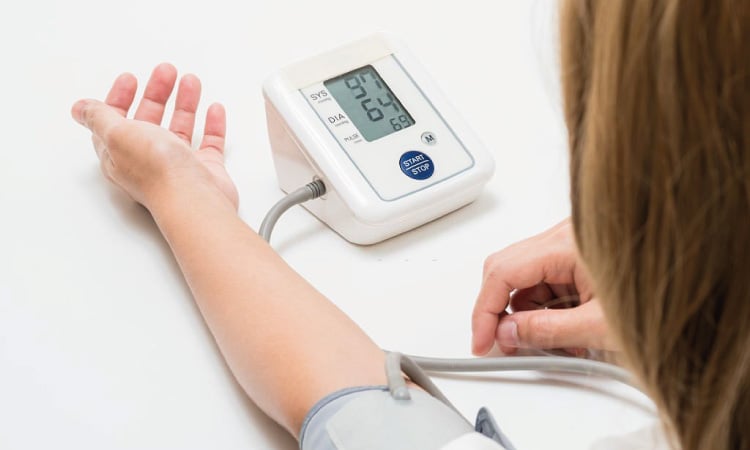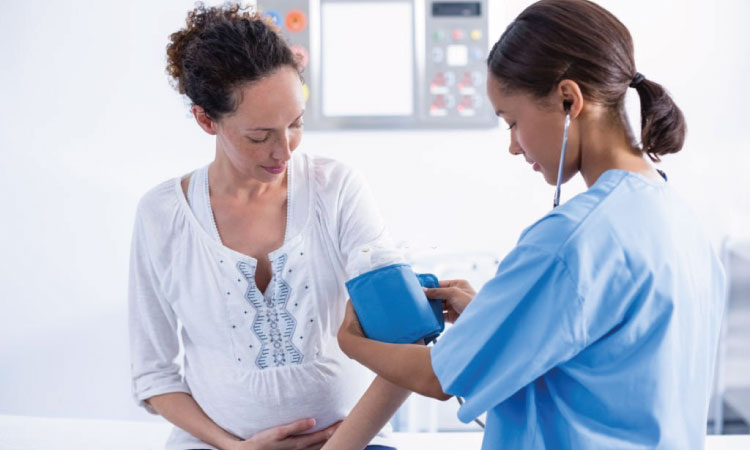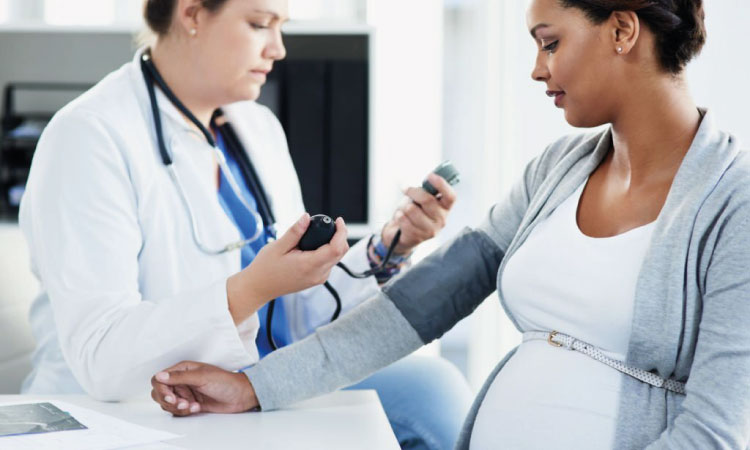Pregnancy increases a woman’s risk of hypertension or high blood pressure. One in ten pregnant women is diagnosed with high blood pressure1. However, high blood pressure during pregnancy doesn’t necessarily pose a danger. But pregnant women having hypertension requires extra attention. The earlier it is detected, the lower the risk of pregnancy complications. Certain hypertension medications are not suitable for pregnant women. But if your doctor prescribes medicine to help keep your blood pressure in check, make sure you take it each day. You can also try some home remedies that can help control high BP during pregnancy along with medications.
Check out this article to learn 9 natural remedies for high blood pressure during pregnancy.
What Is Blood Pressure?
During blood circulation, the arteries are subjected to pressure from the blood. Blood pressure is the force exerted by circulating blood against the walls of blood vessels. A person’s blood pressure tends to fluctuate throughout the day. It declines when the person is relaxed and increases momentarily when they are excited or under stress.
A blood pressure reading consists of two numbers:
- The first number is systolic blood pressure which reflects the pressure exerted by the blood against the artery walls as the heartbeats.
- The second number is diastolic blood pressure which reflects how hard your blood is pushing against your artery walls when your heart is at rest.
A normal blood pressure level is less than 120/80 mmHg
What Is High Blood Pressure?
An increase in blood pressure can be attributed to a tightening of very small blood vessels called arterioles. The vessels can become narrow or blocked for a variety of reasons. Therefore, the heart must pump harder to overcome the resistance in the narrowed blood vessel. Therefore, the force of blood flow against the narrowed blood vessel is greater than normal. This increases the pressure inside the vessel. Blood pressure is considered high once the reading rises above 120/80 and is one of the common complications faced during pregnancy and delivery.
What Are The Types Of High Blood Pressure During Pregnancy?

High blood pressure during pregnancy can occur in 3 forms:
- Chronic hypertension: A woman can develop this condition before pregnancy. Speak to your doctor if you plan to become pregnant while having high blood pressure. Getting it under control before getting pregnant is best
- Gestational hypertension: A type of high blood pressure that occurs during pregnancy. Most often, it occurs during the second half of pregnancy, or earlier if a woman is pregnant with multiples. This condition increases the risk of developing preeclampsia
- Preeclampsia: A condition characterized by proteinuria (protein in the urine) and high blood pressure occurring after the second trimester of pregnancy. Both the placenta and the baby can be affected by preeclampsia. It can also affect your liver, kidneys, and brain. Preeclampsia can even lead to bleeding problems
What Are The Common Causes Of High Blood Pressure During Pregnancy?
The causes of chronic hypertension that occur outside of pregnancy are usually due to a combination of factors. These can include obesity, physical inactivity, and even ingesting lots of salty foods. Heredity can also play a role.
Calculate Due Date With LMP
It is not known why women develop gestational hypertension and preeclampsia. However, women who already have high blood pressure, diabetes, kidney disease, lupus, or other autoimmune diseases prior to pregnancy are at higher risk of high blood pressure during pregnancy.
The following are other common causes of high blood pressure during pregnancy:
- First-time pregnancy
- Pregnant with twins, triplets, or other multiples
- A woman’s maternity age. Women under the age of 20 or over the age of 35 are more likely to develop high blood pressure during pregnancy
- Obesity
- Previous pregnancies with high blood pressure or preeclampsia
- Preeclampsia runs in the family (mother or sister)
- Having gestational diabetes
Related Reading: How To Prepare Body For Pregnancy After 30
Despite the possibility of complications arising from high blood pressure (hypertension) during pregnancy, a successful pregnancy with high blood pressure is not impossible. Generally, pregnancies and births go smoothly for women who are closely monitored and promptly treated.
Top 9 Natural Remedies For High Blood Pressure In Pregnancy
It is not possible to get immediate treatment for high blood pressure at home except to take the prescribed medication. The good news is that you can use many home remedies to control/prevent high blood pressure during pregnancy.
Following are 9 effective natural remedies for high blood pressure in pregnancy:
1. Add potassium-rich foods to your diet
Potassium-rich foods can lower blood pressure1. Potassium is found in a wide range of plant and animal foods and beverages. Eat potassium-rich foods such as dried fruit, bananas, sweet potatoes, meat, tomatoes, kidney beans, tuna, potatoes, peas, melon, orange juice, and cantaloupe.
Related Reading:
Pregnancy requires an adequate supply of potassium. Besides maintaining fluid and electrolyte balance, it also aids in muscle cramps during pregnancy and enhancing bone density2.
2. Limit sodium intake
Limiting or eliminating salt from your diet is one of the natural ways to lower your blood pressure. Excess sodium contributes to an increase in blood pressure3. While pregnant, the hormones are highly imbalanced, which adversely affects the body’s natural functions such as the ability to digest salt. If salt is not digested properly or is excessive in diet, it can elevate blood pressure. Reduce your intake of salty foods. You can also find high levels of sodium in processed foods such as bread, cheese, and meat, as well as in seasonings and sauces.
Related Reading: 9 Types Of Cheeses To Avoid During Pregnancy
3. Include magnesium in the diet
As per a study, magnesium helps manage extreme blood pressure issues. Taking magnesium supplements has been shown to lower blood pressure by increasing nitric oxide production, a signaling molecule that helps relax blood vessels4. When pregnant, eating magnesium-rich foods like bananas, avocados, almonds, tofu, and soy milk helps keep your blood pressure under control. Furthermore, it prevents the uterus from prematurely contracting during pregnancy.
4. Stay physically active
Women who are inactive during pregnancy have a higher risk of hypertension than those who exercise. Pregnant women should walk regularly to improve their cardiovascular health.
The daily walking of 30 to 45 minutes can lower blood pressure5. Walking is a safe exercise that a pregnant woman could continue to practice throughout the nine months of her pregnancy.
Engage in regular physical activity for at least 30 minutes a day. Consult your doctor before beginning an exercise program to ensure the activity is safe for you.
Related Reading: 8 Benefits Of Exercising During Pregnancy
5. Relax and de-stress

Stress is an important factor that can trigger high blood pressure. Stress stimulates the nervous system to produce large amounts of vasoconstricting hormones6. As a result, blood pressure increases. Women are more likely to experience anxiety, depression, and stress while pregnant. Anxiety and depression are also the leading causes of hypertension. Find ways to alleviate stress.
- Stress can be reduced through meditation and yoga
- Prenatal massages can help manage stress during pregnancy
- Stress levels can be lowered and blood pressure can be stabilized with deep breathing techniques. Additionally, when you breathe deeply, the well-oxygenated blood reaches every cell of your body including the fetus. You can lower your blood pressure and maintain a healthy heart by practicing deep breathing for 10 minutes 2 or 3 times a day
- You can lower your blood pressure by listening to the right type of music two or three times a day for at least 30 minutes7. People can be calmed by low-tempo and low-pitched music, without loud instrumentation or lyrics when they are stressed.
Related Reading: 7 Natural Remedies For Anxiety During Pregnancy
6. Embrace a healthy lifestyle
Maintaining a healthy lifestyle during pregnancy is essential.
- During pregnancy, alcohol can cause such serious complications that doctors recommend you forgo any alcohol. One of the major reasons behind this is the possibility of high blood pressure. The side effects of smoking, like those of drinking, are severe. Because smoking damages blood vessel walls, it poses a risk to people with high blood pressure. In addition to causing high blood pressure, smoking can also cause cancer, weight gain, anxiety, and depression. If you are pregnant, these risks increase more than fourfold
- Sleep deprivation is a common problem during pregnancy, you’re more likely to develop health conditions that cause high blood pressure. Aim to get 7-9 hours of good quality sleep every night
7. Reduce the intake of caffeine
Even if you don’t have high blood pressure, few drinks should be completely avoided during pregnancy and caffeine is one of them. Caffeine can lead to a dramatic rise in your blood pressure. Those who suffer from hypertension experience an increase in blood pressure after consuming caffeine. Exactly why this occurs is unclear. Also, each individual’s response to caffeine is different. Caffeine, however, should be limited during pregnancy as it can result in numerous complications.
8. Focus on gaining healthy weight
Being overweight is another risk factor for hypertension, so it is crucial to maintain a healthy weight gain throughout pregnancy. Exercising and eating well will help you to control your weight gain during pregnancy.
Pregnant women who are overweight are prone to pregnancy complications such as back pain, arthritis, leg cramps, exhaustion, hemorrhoids, gestational diabetes, GERD or acid reflux, and heartburn. Follow your doctor’s instructions with regard to safe physical activities and discuss the weight that’s right for you.
9. Natural supplements
Blood pressure can also be lowered by some natural supplements. The following supplements have been shown to lower blood pressure. Before taking these natural supplements, make sure to discuss them with a doctor:
- Garlic extract: A number of studies show that aged garlic extract can successfully lower blood pressure as a standalone treatment or in conjunction with conventional therapies
- Whey protein: Whey protein may reduce blood pressure and increase blood vessel function8
- Fish oil: Taking fish oil supplements has been shown to lower blood pressure. Several studies suggest that fish oil might be more beneficial for people with moderate to severe high blood pressure than for people with mild hypertension9
Conclusion

No matter if you have high blood pressure before or during pregnancy, high blood pressure during pregnancy requires care. Pregnant women who are diagnosed with high blood pressure should look for natural remedies and lifestyle changes to control blood pressure. Naturally lowering blood pressure during pregnancy with the remedies and tips outlined above is not a medical cure for people with genetic blood pressure issues. Always consult your doctor before starting or stopping medication or treatment during pregnancy, whether natural or not. It is important to remember that even naturally occurring substances can pose health risks to some people.
FAQs
Pregnant women who have high blood pressure may experience worsening of the condition during labor and delivery. This can lead to several life-threatening complications.
The mother can suffer complications during delivery, such as bleeding in the brain, hemorrhagic strokes, and seizures. The doctor will closely monitor the pregnant woman with high blood pressure during her labor and delivery, and if she appears to be worsening during labor, an emergency cesarean will be performed.
In most cases, high blood pressure during pregnancy disappears after the baby is born. However, the new mother should be monitored carefully for several weeks after giving birth to rule out any complications.
In order to make sure their blood pressure returns to normal levels, women with high blood pressure resulting from another condition (chronic hypertension) need to see the doctor.
High blood pressure during pregnancy can restrict blood flow to the placenta. Because the baby of a high blood pressure mother receives insufficient nutrients and oxygen during pregnancy, they are more likely to be born prematurely or with low birth weight.
This is why it’s very important to detect and treat high blood pressure early.

